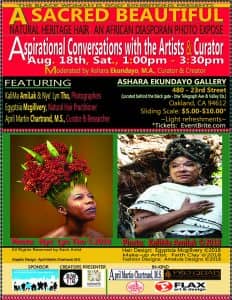An event celebrating natural hair, described as aspirational conversations with the artists and curator, is coming to Oakland Saturday, Aug. 18, 1-3:30 p.m., featuring
- KaliMa AmiLak and Nye’ Lyn Tho, photographers
- Egyptsia Mcgillvery, natural hair practitioner collaborator
- April Martin Chartrand, M.S., curator and researcher
Tickets, for $5, are available at the door. The location is Ashara Ekundayo Gallery, 480 23rd St., located behind the black gate, between Telegraph Avenue and Valley Street in Oakland, an 11-minute walk from 19th Street BART. Light refreshments will be served.
Curator’s statement

According to April Martin Chartrand, M.S., curator and researcher for this exhibition, these creative hair iconoclasts create paradigm shifts in consciousness, embody keen sensibilities and usher in the acceptability of presenting diverse ways of being, through their prolific visual aesthetic lens.
Creating exquisite Diasporan textural imagery, AmiLak and Tho, aspirational photographers, and Mcgillvery, Natural Hair Movement designer, embody Ma’atian cultural consciousness and are paradigm shape-shifters. In essence, these new-day shape-shifters embrace visionary sensibilities and illuminate the acceptability of presenting diverse ways of existing in the world.
Curator Chartrand posits that “A Sacred Beautiful” exhibition was inspired by curatorial research of the “reclamation of our hair-itage,” the global African Diasporan Natural Hair Movement, birthed in the 20th century, and to bring attention to the dreadful Louisianan 1786 Tignon Law.
Passed in Spanish colonial Louisiana in 1786, the tignon laws prohibited Black women from showing their hair. Because White men were attracted to Black women, who adorned their hair with jewels and beads, Black women, whether enslaved or free, were ordered to wrap their hair to conceal it, so they used bright colored scarves, jewels and ribbons and creative wrapping techniques to make their tignons a fashion statement.
April Martin Chartrand, M.S., obtained her 2017 graduate degree from San Francisco State University and graduated with scholastic distinctions as a vetted member of the Chi Sigma Iota International Honor Society. In addition to her work with “Black Woman Is God” and this exhibit, she is a national award-winning textile artist, fiberalchemist, and the author and illustrator of “Angel’s Destiny: A Novel Story of Poems and Illustrations” (2009).
To learn more, contact Chartrand at april.martin.chartrand@gmail.com.





